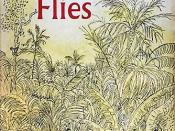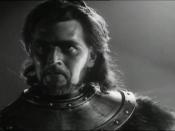"It is not what an author says, but what he or she whispers that is important," by Logan Pearsall Smith. This quote means that the author delivers the theme through underlie themes. A lot of the times he may not come out and say what they are trying to say. Most of the time you have to read between the lines. This statement is true in literature as well as in life. Two literary works that prove this quote to be true are "The Tragedy of Macbeth", the play, by William Shakespeare and "The Lord Of The Flies", the novel by William Golding.
"The Tragedy of Macbeth", the play, by William Shakespeare proves this quote to be true by using many different methods. William Shakespeare uses themes to whisper that too much drive for something can help to destroy a person. Also taking part in evil can destroy a person.
The Main character, Macbeth, allows his drive, or tragic flaw, to control his life to the point of death. One Example is when Macbeth gets killed because he killed so many other people, including Macduff's family, and Macduff wanted revenge. In it self the title of the play "The Tragedy of Macbeth", is a way of the author whispering to the audience that Macbeth will die by the end of the play. Throughout the play Shakespeare tells the readers that it was his drive and participation in evil that lead the Macbeth's death, you just have to read between the lines to see this.
The second literary work that helps to prove this quote to be true is "The Lord Of The Flies", the novel by William Golding. This novel also uses theme to prove this quote to be true. Golding whispers that...


